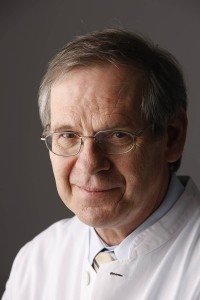he number of patients with neurological diseases will rapidly increase in Europe during the next 50 years. For some of the neurological diseases even a doubling of the numbers of patients is expected. Therefore more neurologists are needed. One of the most important tasks of the EAN is to support all attempts to increase the attractiveness of neurology as a profession and to improve teaching for students, trainees and residents in our field.
Category
Executive Page
-
-
Neurological diseases are seriously affecting life quality of the patients. Many of these diseases are followed by life-long disabilities or the patients even need care for the rest of their lives. Our daily work for the patients with neurological diseases transfers for politicians into costs for the Society and a recent analysis has found the annual costs for neurological diseases in Europe to be >300.000 Mio €¹, which is more than the annual budget of the German government.
-
The Lasker-DeBakey Clinical Medical Research Award is one of the most important medical awards and goes this year to Mahlong R. Delong, Atlanta, USA and Alim Benabid, Grenoble, France for the ‘development of deep brain stimulation of the subthalamic nucleus (STN-DBS), a surgical technique that reduces tremors and restores motor function in patients with advanced Parkinson's disease’.
-
The European Academy of Neurology has existed for 4 months now and many of the first steps are behind us. The latest step is that we can accept members now from the administrative side of the process. Therefore I will use my President’s Page today to explain why you should become a member. According to the bylaws of the Society we will have institutional and individual members.
-
The EAN is a young Society and our purpose is to promote ‘Excellence in Neurology in Europe’. This task has many facets and one of them is to engage more people in the Society. This process is presently underway.
-
Neurology is an important discipline and is rapidly developing. Recent economic studies have identified that one third of the European population is affected by a brain disease and they need treatment by neurologists, neurosurgeons and psychiatrists. The costs for these diseases are getting astronomic.
-
 by Günther Deuschl
Dear colleagues,
The European Academy of Neurology (EAN) has been founded on the 3rd of June 2014 in Istanbul. A new era of European neurology is starting because all neurologists in this part of the world have… Continue Reading
by Günther Deuschl
Dear colleagues,
The European Academy of Neurology (EAN) has been founded on the 3rd of June 2014 in Istanbul. A new era of European neurology is starting because all neurologists in this part of the world have… Continue Reading -
This, our last Presidents’ Page, marks the foundation of the EAN. It is adapted from our longer editorial in the European Journal of Neurology which will be the journal of the EAN.
-
Executive Page
“To err is human…” …but we still need to disclose and decrease medical errors (also in neurology…)
May 1, 2014by Claudio Bassetti and Richard Hughes We all remember the professional disappointment that we experienced following a medical error, our own emotional distress, sadness and fear of consequences for the well-being of our patients. Performing an honest and thorough examination… Continue Reading -
The European Brain Council, brain child of former EFNS President Jes Olesen, has announced the launch of the long waited Year of the Brain (YotB) this year. We had an official European Union Month of the Brain in May 2013 to which we have already drawn attention in NEUROPENEWS [https://www.eanpages.org/?p=3375].
-
Most neurologists used to carry out few practical procedures beyond the neurological examination which one of us has already discussed in this Forum (https://www.eanpages.org/?p=1443). This is changing. Some undertake diagnostic procedures such as electrophysiology, ultrasonography, nerve, muscle and now skin biopsies.
-
Executive Page
Presidents’ Page: On the future of academic general neurology: Yes, but how?
February 1, 2014In our Presidents' letter of November 2013 we concluded that academic general neurology should have a future. Among the main reasons for this statement we listed the care of patients, the education of students and residents, the growing evidence for an intricate and unsuspected relationship between many diseases of the nervous system, each today still „belonging“ to separate subspecialties. -
After the Christmas and New Year festivities, it is time to think of the standard of care we provide for our patients on holidays and at weekends. A day of rest, Friday, Saturday or Sunday, is built into the Muslim, Jewish and Christian week.
-
Conflicts of interest (COI) in biomedical research are a matter of increasing interest, concern and debate and have led particularly over the last 10 years to a number of studies to analyse the problem and recommendations to avoid it. One of the last and most prominent recommendations is that of the Institute of Medicine in the US, in which COI were defined as follows: “a set of circumstances that creates a risk that professional judgement or actions regarding a primary interest will be unduly influenced by a secondary interest” (1).
-
When we started our speciality training in the UK and Switzerland in the 1970s and 1980s, general neurology was the backbone of clinical care and teaching in our countries (and most countries in Europe).
